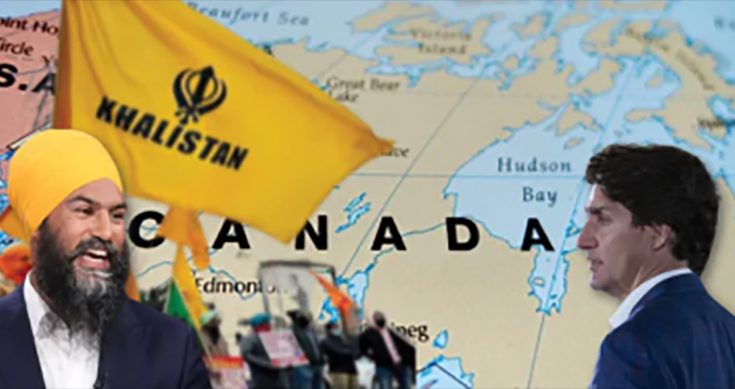IBNS: The Canadian government’s silence on the issue of Khalistan separatism is raising eyebrows worldwide. This complex dance of politics, largely driven by the influence of a handful of individuals in the Sikh diaspora, is not only endangering Canada’s own national interests but also risking its economic future.
Recently, the city of Brampton hosted a parade featuring a disturbing tableau depicting the assassination of the late Indian Prime Minister Indira Gandhi. This event starkly highlighted the burgeoning influence of Khalistan separatists in Canada, a phenomenon that has been growing since the tragic incident of the Air India flight 182 in 1985. The fact that Canadian politicians have allowed such separatist voices to grow louder is a dangerous game of appeasement, which seeks to secure votes at the expense of broader national interests.
Despite the outspoken opposition to separatist ideologies from certain Canadian politicians, like Chandra Arya, the road to a comprehensive resolution remains long and arduous.
Several Canadian politicians have been accused of bowing to Khalistan separatists to secure electoral victories. This strategy, though potentially fruitful in the short term, threatens Canada’s long-term interests by undermining the potential for deep ties with India, one of the world’s largest economies.
Jody Thomas, Canada’s National Security Advisor, recently accused India of ‘interference’, a claim that arguably was an attempt to appeal to a certain voter base. However, pandering to extremists and separatists could backfire and damage Canada’s reputation on the global stage.
With the Canadian economy already struggling, a strategic partnership with India could open avenues for increased trade, potential partnerships in the manufacturing sector, and access to a pool of skilled workers, which could address the labour and skill shortage that is currently crippling the Canadian economy. Canada had in fact earlier identified India as a critical partner in their Indo-Pacific strategy.
However, this potential economic boon is being overshadowed by vote-bank politics. The appeasement of Khalistan separatists, in an effort to secure electoral victories, threatens to strain the relationship between Canada and India. As a result, Canada could miss out on a valuable economic opportunity that could help turn around its economic downturn.
India has maintained strong trade and business ties with Canada, as evidenced by Prime Minister Justin Trudeau’s request for Covid vaccines from India in 2021. However, the increasing influence of Khalistan separatists in Canada and the associated political appeasement could strain this relationship.
The Sikh diaspora, comprising 2.1 percent of Canada’s total population, plays a significant role in Canadian society and politics. Notably, Jagmeet Singh, a Canadian Sikh, is the head of the Canadian Left-leaning New Democratic Party. The potential influence of this community on the political landscape is significant, but it also raises the risk of manipulation by extremists who advocate for separatist causes, such as Khalistan.
While vote-seeking politics might deliver short-term electoral gains, they threaten to isolate Canada internationally, damage its national interests, and disrupt the potential for economic growth through stronger ties with India. The Canadian government must therefore tread carefully, ensuring that it does not compromise its future for the sake of short-term political gains.
Image and Text: Khalsavox.com
#Canada, #CanadaPolitics, #Khalistan





